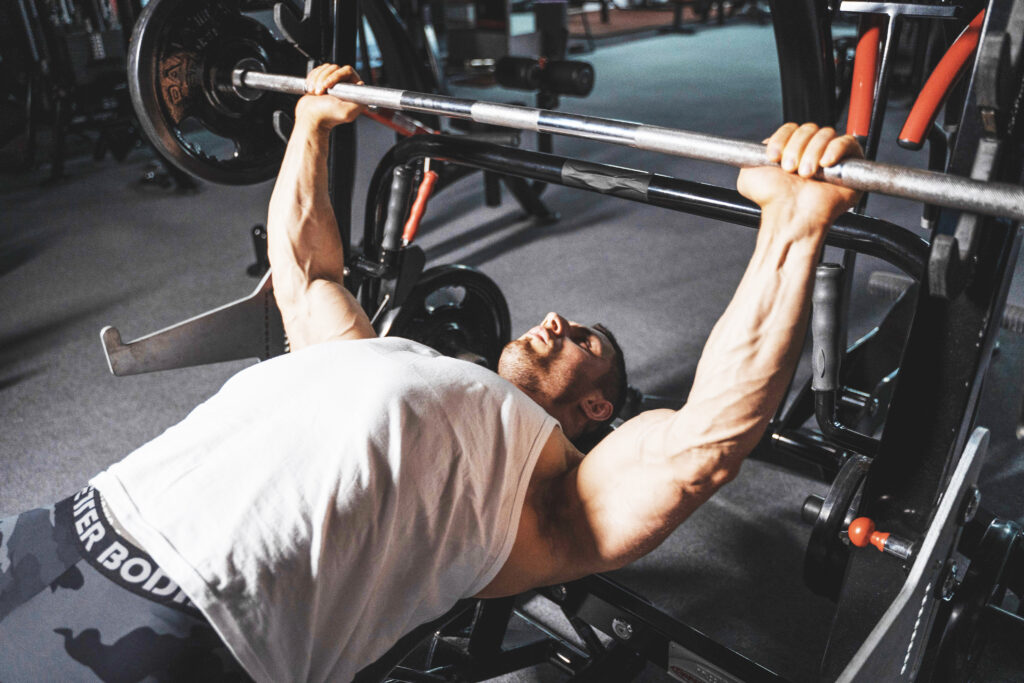
The bench press is a popular strength training exercise that primarily targets the chest, shoulders, and triceps. The following are some advantages of including bench presses in your exercise regimen:
- Chest Development: The bench press is renowned for its effectiveness in developing the pectoral muscles, helping to create a well-defined and strong chest.
- Shoulder Strength: It also engages the deltoid muscles in the shoulders, contributing to overall shoulder strength and development.
- Triceps Activation: The triceps are heavily involved in the extension phase of the bench press, making it an effective exercise for building triceps strength.
- Stabilization: Bench press requires stabilization of the entire body, engaging muscles in the core, legs, and back, promoting overall stability and balance.
- Compound Movement: It’s a compound movement, meaning it involves multiple joints and muscle groups simultaneously, making it an efficient exercise for targeting various muscle groups in one movement.
- Improved Upper Body Strength: Regularly incorporating bench press into your routine can lead to increased upper body strength, which can be beneficial for various activities and sports.
- Bone Health: Weight-bearing exercises like the bench press can contribute to improved bone density, particularly in the upper body.
- Boosts Metabolism: As a compound and intense exercise, bench press can contribute to an increased metabolic rate, potentially aiding in weight management.
It’s important to note that proper form is crucial to prevent injuries. If you’re new to bench pressing or weightlifting in general, it’s advisable to start with lighter weights and gradually increase as you become more comfortable and confident in your technique. Additionally, it’s always a good idea to consult with a fitness professional or healthcare provider before starting a new exercise program, especially if you have any existing health conditions or concerns.
What is the Proper Way to Perform a Bench Press?
When completing a bench press, the barbell should be lowered to the level of the chest and then raised back up until the arms are completely extended. It’s critical to keep your form and refrain from bouncing the bar off your chest during the exercise.
How Do You Know That Your Bench Press is Correct?
Pause on your chest for a half-second. Then push the bar up until the arms are in a straight line across the shoulders. Congratulations. You just finished a flawless bench press..
While Doing a Bench Press, Should the Bar Hit Your Chest?
When you do a bench press, you should usually lower the bar until it either very nearly hits your chest without bouncing, or it touches it very lightly.
How Do You Feel Your Chest During Benching?
Maintain an arched back, relaxed shoulders, and concentrate on using your chest muscles to push back and resist as you lower the bar. You will feel the bench press in your chest if you maintain your shoulders back and your back arched. The first and most important consideration when weightlifting is safety.
When Benching, Where Do You Touch Your Chest?
A decent starting position would be parallel forearms at the bottom of the exercise, with the bar touching directly on the sternum (the indent in the center, just below your pecs).
How Much Weight Should a Beginner Bench Press?
A typical male novice could try to bench press 135 pounds. On the other hand, a novice woman might begin with a 65-pound lift. Keep in mind that these are only averages and that everyone’s ability varies greatly.
When You Bench, Where Do You Look?
When you perform a bench press consistently, you should be able to repeat the top portion of the bar path by fixing your attention on the ceiling. At the bottom, you focus on hitting the same spot on your chest with each repetition, so make sure to pay attention to that.
Does Squeezing the Bar Improve Bench Press Performance?
Crushing the bar not only increases the lift’s safety, but it also allows you to lift heavier loads. Here is why. Squeezing the snot out of the bar during benching works because of greater rotator cuff activation, improved wrist alignment, and increased aggression.
Why Don’t I Feel Bench Press in My Chest?
Most likely, you are bench pressing using your shoulders and/or triceps. If you want to increase your chest size, you must learn how to recruit it. Muscles that are not engaged are not fatigued, and muscles that are not fatigued do not grow. First, remove close grip labor from your lexicon.
Why Isn’t My Bench Press Hitting My Chest?
It’s possible that poor form or insufficient muscle activation is the reason why you’re not feeling your pecs working during bench presses. Ensure that you are utilizing your entire range of motion and concentrate on contracting your chest muscles at the peak of the exercise.
What is Benching 225 So Crucial?
It’s significant because it marks a turning point in bench pressing for many. The lifter has never placed two plates on either side of the bar before. Because the bar weighs 45 pounds and each plate weighs 45 pounds or 20 kilograms, the total comes out to 5×45=225.
In a Bench Press, Should I Bend My Wrists?
Refrain from allowing your wrists to slump forward or bend too far back. Furthermore, you can support your wrists by using your forearm muscles and keeping appropriate form throughout the workout.
When I Bench, Why Do My Wrists Bend?
When bench pressing, a common cause of wrist bending is grasping the bar too high up on the hands, such as just below the fingertips. Never begin with a grasp wider than your shoulder’s width. Overly wide grips are a typical mistake that can result in bad form and injury.
When Performing a Bench Press, Should I Squeeze My Shoulder Blades?
Yes, in order to provide a sturdy basis and safeguard your shoulders during bench pressing, it is crucial to squeeze your shoulder blades together. This aids in activating your upper back muscles and preserving good form during the workout.
Why, Despite My Strength, Am I Unable to Bench Press?
This is most likely due to a slight deficiency in your chest. Despite being a complex exercise that demands general strength, the bench press primarily targets the chest muscle area. It is advisable to concentrate harder on the chest in order to bench press greater weight.
Why is My Bench Weak but My Chest Strong?
Even though your other chest exercises are comparable to your friend’s, there could be a number of reasons why your bench press is weaker. Your form and technique during the bench press may not be optimal, which could result in inefficiencies and a reduction in the amount of strength you produce.
Can a Person Build Their Chest With Just Bench Press?
You’re never able to get on the flat bench in your gym because most men want to bulk up their chests. However, even while the bench press lets you lift a lot of weight, it doesn’t work every muscle fiber, so you can’t really build your chest above a certain point with just this exercise.
Why Do I Feel It More in My Arms Than in My Chest When I Bench Press?
This is a typical mistake, particularly if you are new to weightlifting or have not received sufficient instruction. Your elbows may be flaring out excessively, shifting the emphasis from your chest to your arms. To fix this, consider bringing your elbows closer to your torso and activating your chest muscles more.
Why Do My Shoulders Hurt When I Bench Press?
When executing the bench press, it is critical to maintain perfect form and technique. You may want to consult with a fitness professional to analyze and adjust your technique. When you bench, your shoulders typically take control, indicating poor posture. The bottomline is, keep the chest high and the shoulders back!
Can 315 Be Benched Naturally?
When they first start, almost every guy can bench press 135 pounds. After around 8-12 months of training, many people can bench press 225 pounds. However, few ever exceed 315 pounds, which is equivalent to three large plates on both sides of the bar.
Should You Fail Every Set on the Bench?
Because attaining failure is mentally and physically exhausting, it is not recommended that you hit your endpoint in every set of every exercise. Going close to failure but not to failure is generally best for muscle mass in the majority of your training sessions.
Can You Bench Press Two Days in a Row?
It is generally not advisable to work the same muscle groups on consecutive days, as this might lead to overtraining and an increased risk of injury. Muscles require time to recover and mend after exercise, particularly with heavy pressing such as bench presses.
Why is the Bench Press So Difficult to Improve?
One typical explanation is that the muscles utilized in the bench press may be weaker or less developed than those used in squats and deadlifts. Furthermore, the bench press is frequently more technique-dependent, thus working on improving your form and technique may help you improve your bench press.
How Long Does It Take to Recover From Bench Presses?
It is recommended that you wait 72 hours before working out the same muscle group again. This allows your body to recuperate and increase hypertrophy without risking damage due to overtraining.
How Long Should You Rest Following a Set of Bench Presses?
Adequate rest between sets allows for a high degree of force generation in the next set. Thus, normal rest intervals for growing strength range from 2 to 5 minutes, as research has shown to be beneficial for strength development.
What Should Hurt After Doing a Bench Press?
It is usual to experience pain in the pectoralis major (chest muscles), triceps brachii (back of the upper arm), and deltoids (shoulder muscles) following a bench press. These are the key muscles involved in a bench press workout.
Is It Tougher to Bench With a Wider Grip?
Compared to the narrow grip, the broader grip places a higher emphasis on the pectoral muscles, so if you want to grow your chest, this is an excellent option. Lift more weight – A wide grasp often allows you to lift more weight than a narrow grip.
How Frequently Should You Increase the Weight on the Bench Press?
When assessing if it’s time to raise the amount of weight you’re lifting, apply the “2 for 2” approach. Increase the weight when you can perform two more reps with the same weight that you used on the first two sets.
Conclusion
Maintaining proper form is critical for avoiding injuries. If you’re a beginner at bench pressing or weightlifting, start with lesser weights. Gradually raise the weight as you develop confidence and master the technique. Furthermore, speaking with a fitness professional or healthcare practitioner before starting a new workout program is a good idea, especially if you have any existing health ailments or concerns. Finally, continue learning as the journey into fitness is a marathon and not a sprint.

